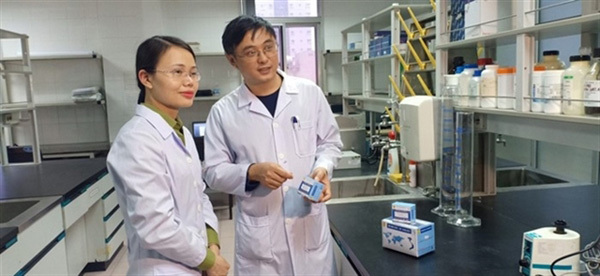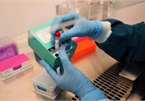 |
| Dinh Thi Thu Hang (left) discusses research work with her colleague. — Photo vtc.vn |
Hang works in the Department of Microbiology and Pathogens under the Military Medical Research Institute and is also a lecturer in the Medical Microbiology Faculty under the Vietnam Military Medical Academy.
She is one of the key members participating in the State-level project 'Research and manufacture of biological products RT-PCR and real-time RT-PCR to detect new coronavirus strains'.
'Eat, sleep' SARS-CoV-2
Every day, the 37-year-old woman from the central province of Ha Tinh, Hang goes back and forth between the Military Medical Research Institute and the Vietnam Military Medical Academy.
This time last year, Hang and her colleagues of the Vietnam Military Medical Academy studied day and night, rushing to complete the first SARS-CoV-2 detection product in Vietnam licensed by the Ministry of Health for fast and accurate test results.
They only had a month to manufacture the kit, making it a time when the research team "ate and slept with the virus," she said.
Hang told vtc.vn that thanks to her experience in researching and manufacturing the Ebola test kit in 2013-15, she and her colleagues completed the assigned work fairly quickly.
“We had to race against time so hard. We work for a large institute belonging to the military, so any research error is unacceptable. We work with the spirit of the soldier, not allowing ourselves to fail. That spirit makes us find all research paths. In the end, we were successful,” Hang said.
Her colleagues call her a "three-in-one" scientist because she was both researching, teaching and a soldier.
Her work also resonated in the scientific community when she patented a useful solution for the invention of the multi-primer kit real-time RT-PCR for quick diagnosis of Ebola Zaire virus of the National Office of Intellectual Property of Vietnam.
Modest and simple, she says her success is too small.
She has also contributed to the scientific community as the author of 29 outstanding articles, including four published in international journals and 25 articles published in reputable Vietnamese science journals.
With her contributions, Hang has received Creative Youth Awards at different levels. She was awarded the Certificate of Merit by the Ministry of Science and Technology and Ministry of Education and Training in 2020.
Secret of success
When the COVID-19 pandemic appeared in Vietnam, the Vietnam Military Medical Academy’s research team was tasked with making the test kit for SARS-CoV-2 only a week before the Tet (Lunar New Year) holiday. She and her colleagues had to forget their personal lives to focus on research.
During the days away from home, she worked and forgot to eat, sleep, and struggled with being away from family. As soon as the clinical trial kit was a success, the first thing she thought of was going to her hometown to visit her children and relatives.
Due to her work, Hang often has to work late. Many times she mentioned her husband who always understands and helps her with the family chores.
“Women who work in science have a lot of hardships, but I'm lucky to have a family that always supports me. After stressful working days, hearing the voice of my children, a lot of anxiety and fatigue disappears. Even though my children are small, they understand my hard work and tell me to take care of my health," she said.
She also said that her research group had many very young students. Everyone considers each other like family and the previous generation guided the following generation to contribute to the society.
VNS

The ‘father’ of Made-in-Vietnam SARS-CoV-2 test kit inspires others
Major Dr Hoang Xuan Su has played a key role in developing Vietnam’s SARS-CoV-2 test kit. He is one of 14 people nominated by VietNamNet as Inspiring Characters.

Vietnam successfully develops two sets of SARS-CoV-2 test kits
The two test kits' development was based on the technological process of the US Centers for Disease Control and Prevention (US CDC), approved by the FDA (US Food and Drug Administration) in March.